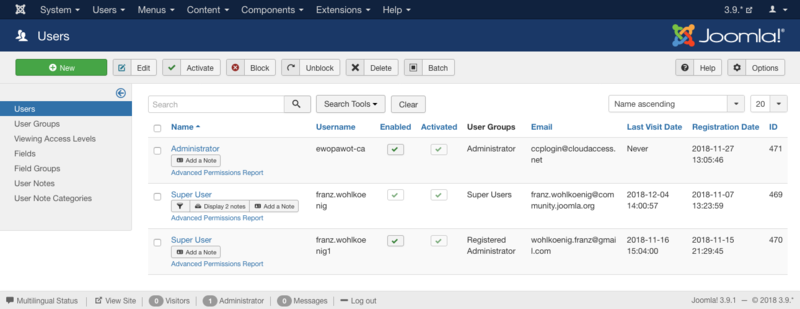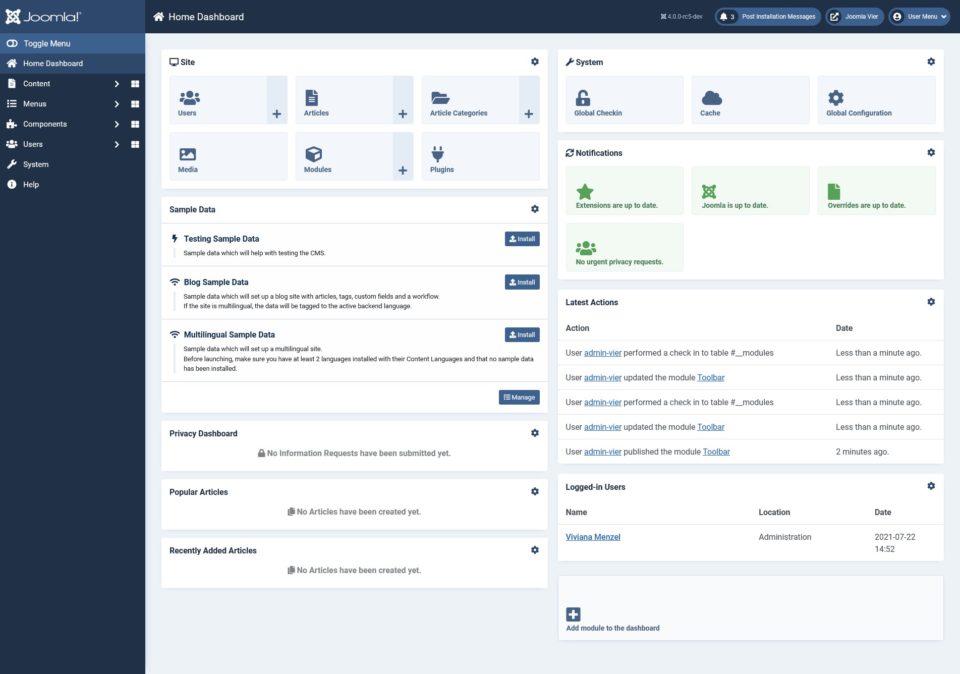Joomla is a content management system (CMS) that powers nearly two million websites and covers three percent of the web. It also holds six percent of the CMS market globally. While those numbers are great, is Joomla the right solution for your website building needs? We will help you answer that question by discussing Joomla’s features, pricing, and pros and cons.
Reading: Best Online Courses to Learn Web Development
Is Joomla Right For You?
Whether you are an experienced site builder or a newbie looking to get your feet wet, Joomla can help. It is one of the most powerful content management systems on the planet, yet surprisingly simple to use. Don’t let that simplicity fool you, though, as Joomla has enough features and extensions to help web designers, web developers, and content managers build complex sites should they need to if they have sufficient technical experience. Joomla is not the only site-building option, however, so before you make your pick, take a close look at WordPress, too, as it is free as well and even more popular than Joomla, giving it a larger online community for support should you need it.
As for who uses this CMS the most, W3Techs found that Joomla is primarily used by small businesses and government organizations to create basic sites that do not get a ton of traffic. It could certainly suffice for a blog or article site or something similarly simple, but if you are looking to build a flashy site that gets a lot of visitors, you may want to keep shopping until you are 100 percent sure you found the right fit.
If Joomla does not seem like the right content management system for your needs, or you are still browsing, check out our review on Joomla competitors that might be a better fit:
Joomla features
Does Joomla have enough features to help you build the website you desire? You can be the judge of that by looking at the list of Joomla features below.
User friendliness
Joomla is user-friendly overall due to its simplistic layout. You will not find a ton of confusing clutter in its Admin panel or dashboard, which gives content managers a trusty feeling of complete control over the building process. You do not need any coding skills to get started, as the What You See Is What You Get (WYSIWYG) editor eliminates the need for such knowledge (although it could certainly help). Adding images to pages is a cinch via drag and drop, and, as you continue to use the CMS to build other elements of your website, you will find that same ease of use as well.
Website Templates
You can choose from thousands of templates when building your Joomla site to get that exact design you are looking for. Best of all, many of those templates are free, and some can be tweaked in terms of layout, font, color, and other style elements, without the need for any coding, HTML, CSS, or JavaScript. Fork over cash for a paid template, and you can get the added benefit of support if you want to make additional changes or need help down the line.
user management

Content managers can set up multiple users for your Joomla site with specific permissions for each. Should someone leave, you can easily delete them from the user list to ensure they no longer have access to the site.
extensions

Most of Joomla’s features do not hit web developers right out of the box. Instead, they can be accessed via extensions that act like plugins. There are thousands of third-party extensions located in Joomla’s Extensions Directory to help you with your search engine optimization (SEO) efforts, setting up reviews, and much more. While installing extensions is not seamless and takes a few steps, the functionality is there, giving you a bit of freedom to build a site with all the features you want.
Search Engine Optimization (SEO) and Digital Marketing
A site that looks great and functions smoothly will go to waste if nobody can find it. Joomla addresses this issue with several out-of-the-box SEO tools to ensure your keywords, metadata, and on-page elements are up to snuff.
Reading: Top Online Courses to Learn SEO
Site Security
Joomla designed its codebase to be rock solid, but it also added features like extensive access control levels and two-factor authentication to keep your website or online store secure. The software is also known for releasing security patches swiftly before exploits spiral out of control.
Multi language support
If you are making a website or ecommerce store that needs to be understood worldwide, Joomla can help with its 70-plus translation packs and support for multilingual content management.
CMS support
Are you seeking dedicated account managers or 24/7 customer service reps that you can lean on when you have issues building or maintaining a site? Then Joomla may not be for you. Since it is open-source software, Joomla instead relies on its vast community of contributors to support users when needed.
Start using Joomla, and you may find that there is no real need for dedicated support, as you can get your questions answered quickly by users if they have not been already. Joomla’s forums are thriving and full of action, and you can also get help via announcements, directories, blogs, groups, courses, training, etc. In short, the Joomla brand is big enough that support is out there, so do not fret about the lack of “formal” help here.
Our sister site HTMLGoodies also has an extensive set of tutorials covering content management systemsincluding Joomla if you are looking to learn more about the CMS.
How Much Does Joomla Cost?
Joomla is open-source software, which means it is free to use. Webmasters can create their own site, tweak it to fit their needs, use certain extensions to boost functionality, and more without worrying about paying a penny.
Does this mean that your Joomla site-building experience will be a 100 percent free one? Not necessarily, since you still have to account for a domain name and hosting. Luckily, these are not typically huge costs since some hosting providers offer free domain names as a perk. For example, Bluehost offers shared hosting for as little as $2.95 per month. This includes a free domain and an SSL certificate for one year to keep your site secure. Pair those low costs with Joomla’s open-source nature, and you can build a site for very little out of pocket.
What can drive up your site costs more? Adding paid extensions to add bells and whistles to your website. You can find these extensions in the Joomla Extension Directory, which has add-on categories for everything under the sun to make your site better, including news display, photos and images, social media, style and design, site management, e-commerce, contacts and feedback, structure and navigation, authoring and content, communication, marketing, and more. As for how much such extensions can set you back, that depends, but you will find most to be relatively affordable with their one-time costs that could hover around $20, depending on functionality and complexity.
Joomla Pros and Cons
What are Joomla’s strengths and weaknesses as a content management system? Here are a few of Joomla’s pros and cons for web development and web design:
Pros:
- Joomla’s open-source nature makes it free to use, so if you are on a budget, you will not have to worry about busting it here
- While you will have to pay for a domain and hosting, many Joomla extensions are also free
- Solid compatibility since it uses PHP scripts
- Lets you build a simple website in very little time, thanks to an intuitive editor
- Joomla’s large community has led to a plethora of support articles and documentation to help you along the way
Cons:
- No dedicated account managers or customer service since it is open-source software, which could be a negative for those seeking peace of mind from such support that comes with paid options
- Some find navigating Joomla to be frustrating and unnecessarily clunky
- Although not necessarily a knock on Joomla, there are better options out there (like WordPress) for those seeking easy site-building and a massive support community
